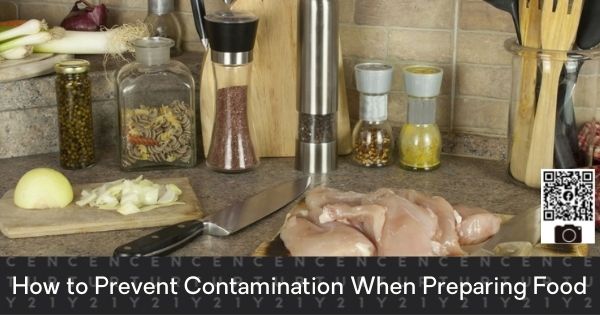How to Prevent Contamination When Preparing Food
Cross-contamination can occur when harmful bacteria are transferred from one place to another. If that happens when preparing food, it can lead to serious food borne illnesses.

Prevent the Spread of Bacteria
Separate raw meat, poultry and seafood from other types of food when shopping, bringing groceries home and storing food in the refrigerator. Place raw meat, poultry and seafood in plastic bags to prevent their juices from contaminating other foods with potentially dangerous bacteria.
Have one cutting board that is only used for meat, poultry and seafood, and a different one that is used exclusively for cutting fruits and vegetables. That can help you prevent cross-contamination. If a cutting board becomes so worn that it’s difficult to clean, replace it.
Practice Good Hygiene
Before handling food, wash your hands with plain soap and water for at least 20 seconds. Clean the backs of your hands, under your fingernails and between your fingers. After you rinse your hands, dry them with a clean towel.
Use hot, soapy water to clean countertops, cutting boards, knives and dishes frequently. Wipe up spills immediately.
Rinse produce before you begin cutting it. Remove damaged or bruised sections first. When handling vegetables, such as lettuce and cabbage, discard the outer layer and only use the inner parts. Rinse produce with water only. Don’t use any type of cleaning product. Dry produce with a clean cloth or paper towel.
Use separate plates and utensils for raw meat and cooked meat, or wash plates and utensils that have been in contact with raw meat before using them to handle cooked meat. That will help you avoid transferring harmful bacteria.
Keep Food at a Safe Temperature
Set the temperature in your refrigerator at or below 40 degrees Fahrenheit and the temperature in the freezer at or below 0 degrees Fahrenheit. Store eggs in the main part of the refrigerator, not on the door, and keep them in the container they were in when you bought them.
Don’t allow perishable foods to go unrefrigerated for more than two hours. If food is exposed to high temperatures, don’t leave it out for more than one hour. Thaw and marinate foods in the refrigerator, not on the counter, and put leftovers in the refrigerator or freezer promptly.
Follow recommendations on minimum cooking temperatures to make sure you kill harmful bacteria. Don’t try to judge whether meat is done based on how it looks or how long you cooked it. Use a meat thermometer. If you aren’t planning to serve food right away, keep it hot so it stays in a safe temperature range.





